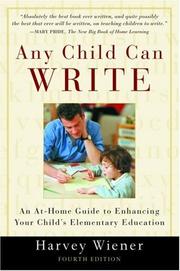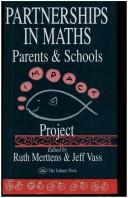| Listing 1 - 10 of 30 | << page >> |
Sort by
|
Multi
ISBN: 9063708084 9789063708085 Year: 1991 Publisher: Nijmegen Instituut voor toegepaste sociale wetenschappen
Abstract | Keywords | Export | Availability | Bookmark
 Loading...
Loading...Choose an application
- Reference Manager
- EndNote
- RefWorks (Direct export to RefWorks)
Book
ISBN: 9264179984 9264179976 Year: 2012 Publisher: [Paris] : OCDE,
Abstract | Keywords | Export | Availability | Bookmark
 Loading...
Loading...Choose an application
- Reference Manager
- EndNote
- RefWorks (Direct export to RefWorks)
L’éducation commence à la maison. Si simples soient-ils, les premiers mots qu’un parent dit à son enfant lui ouvrent les portes du langage et l’initient à un monde d’exploration et de découverte. Lorsque la scolarité officielle débute, de nombreux parents croient que leur rôle éducatif prend fin. En réalité, l’éducation est une responsabilité partagée et selon les dernières conclusions de l’enquête PISA, l’engagement des parents dans l’éducation est essentiel au succès de leur enfant tout au long de sa scolarité et bien au-delà. Lisons-leur une histoire ! Le facteur parental dans l’éducation rend non seulement compte des conclusions et des analyses de l’enquête PISA, mais offre aussi aux parents, aux enseignants et aux décideurs des suggestions concrètes pour améliorer l’engagement parental, tout en soulignant les formes d’activités les plus fortement associées à l’amélioration des performances en compréhension de l’écrit. Il présente également une kyrielle d’exemples de programmes provenant du monde entier qui favorisent un engagement parental efficace et des partenariats fructueux entre les parents et les écoles. Enfin, il montre surtout aux parents qu’il n’est jamais trop tôt – ni trop tard – pour s’engager dans l’éducation de son enfant.
Education --- Parent participation. --- Autogestion (Parent participation in education) --- Parent involvement in children's education --- Parent participation in children's education --- Parental involvement in children's education --- Parental participation in children's education --- Home schooling
Book
ISBN: 9463003592 9463003614 9463003606 Year: 2015 Publisher: Rotterdam : SensePublishers : Imprint: SensePublishers,
Abstract | Keywords | Export | Availability | Bookmark
 Loading...
Loading...Choose an application
- Reference Manager
- EndNote
- RefWorks (Direct export to RefWorks)
While teacher knowledge is well-researched and conceptualized, parent knowledge remains largely unstudied. In response, this book details Pushor’s conceptualization of parent knowledge, the unique knowledge that arises from the lived experiences of being a parent, knowledge that is relational, bodied and embodied, intuitive, intimate, and uncertain. Drawing from her narrative inquiry into parent knowledge, Pushor shares and unpacks the stories of one participant as a way to provide a close up view of the parent knowledge a First Nations father held and used in living with and educating his children. Twelve teachers and parents then put forward their individual and contextual experiences immersed in explorations and use of parent knowledge, attending to the questions, How can what parents know enhance schooling experiences for children? How can parent knowledge, used alongside teacher knowledge, inform decisions made in schools and enhance curricular programming and outcomes for children? Using the metaphor of maps … of mapmaking … of living as mapmakers, this book is a storied account of the new practices in which parents and teachers engaged to enable parent knowledge to guide their work with children. It is an honest and vulnerable account of their journeys. The authors puzzle over the complexities and the successes of their work and the resulting impact on children, parents, and teachers. This book is an invitation to educators and parents to consider how to walk alongside one another, using both teacher and parent knowledge, for the benefit of children’s learning and wellbeing.
Education - General --- Education --- Social Sciences --- Parent participation. --- Autogestion (Parent participation in education) --- Parent involvement in children's education --- Parent participation in children's education --- Parental involvement in children's education --- Parental participation in children's education --- Education. --- Education, general. --- Home schooling --- Children --- Education, Primitive --- Education of children --- Human resource development --- Instruction --- Pedagogy --- Schooling --- Students --- Youth --- Civilization --- Learning and scholarship --- Mental discipline --- Schools --- Teaching --- Training
Book
ISBN: 9264176233 9264176195 Year: 2012 Publisher: Paris : OECD,
Abstract | Keywords | Export | Availability | Bookmark
 Loading...
Loading...Choose an application
- Reference Manager
- EndNote
- RefWorks (Direct export to RefWorks)
Most parents know instinctively that spending more time with their children and being actively involved in their education will give their children a good head-start in life. But since most parents have to juggle competing demands at work and home, there never seems to be enough time or they feel ill-equipped to help. This book from OECD's Programme for International Student Assessment (PISA) has some good news for concerned parents: it does not require a Ph.D or unlimited hours for parents to make a difference in their children's education. In fact, many parent-child activities that are associated with better reading performance among students involve relatively little time and no specialised knowledge. What these activities do demand is genuine interest and active engagement. "I enjoyed reading Let's Read Them a Story! The wide sample of countries shows the universality of the conclusions - conclusions which reassure parents that it is important to simply transmit the pleasure of reading to our children. No need to exhaust oneself finding the latest trendy children's books or educational toys; parents should simply read to children, enjoy reading themselves, and make family time to discuss what we've read." -Kristine Minski, mother of two
Education. --- Reading --- Education --- Parent participation. --- Autogestion (Parent participation in education) --- Parent involvement in children's education --- Parent participation in children's education --- Parental involvement in children's education --- Parental participation in children's education --- Parent involvement in children's reading --- Parent participation in children's reading --- Parental involvement in children's reading --- Parental participation in children's reading --- Home schooling
Book
ISBN: 1787142604 1787142612 9781787142602 9781787142619 9781787142619 9781787430273 1787430278 Year: 2017 Publisher: Bingley, UK
Abstract | Keywords | Export | Availability | Bookmark
 Loading...
Loading...Choose an application
- Reference Manager
- EndNote
- RefWorks (Direct export to RefWorks)
Inclusive education. --- Education --- Autogestion (Parent participation in education) --- Parent involvement in children's education --- Parent participation in children's education --- Parental involvement in children's education --- Parental participation in children's education --- Home schooling --- Inclusion (Education) --- Inclusive learning --- Inclusive schools movement --- Least restrictive environment --- Mainstreaming in education --- Parent participation.

ISBN: 1280532483 0198034962 1423775759 9780195153163 0195153162 9781423775751 9780198034964 9786610532483 6610532486 0195153162 9780198034964 0190288396 Year: 2003 Publisher: New York : Oxford University Press,
Abstract | Keywords | Export | Availability | Bookmark
 Loading...
Loading...Choose an application
- Reference Manager
- EndNote
- RefWorks (Direct export to RefWorks)
The popular home program that lets parents teach their children to write, now in a new edition. Harvey S. Wiener shows how parents can encourage their children to write with a home program that can be used from preschool through high school. Beginning with the building of attitudes, Wiener moves through simple, varied and practical experience with the written word. By setting up an atmosphere in the home that encourages creative written expression, coupled with a parent's guidance in writing, children gain an outlook on writing that builds confidence in their abilities to use language. This ne
Education --- English language --- Language arts. --- Communication arts --- Language arts --- Communication --- Autogestion (Parent participation in education) --- Parent involvement in children's education --- Parent participation in children's education --- Parental involvement in children's education --- Parental participation in children's education --- Home schooling --- Parent participation. --- Composition and exercises --- Study and teaching. --- Study and teaching --- Germanic languages

ISBN: 1282373471 9786612373473 1135721653 020348553X 9780203485538 0750701544 9780750701549 0750701552 9780750701556 9781135721657 9781135721602 9781135721640 1135721645 Year: 1993 Publisher: London : Washington, D.C. : Falmer Press,
Abstract | Keywords | Export | Availability | Bookmark
 Loading...
Loading...Choose an application
- Reference Manager
- EndNote
- RefWorks (Direct export to RefWorks)
Written by authors well known in their fields, Merttens and Vass bring together diverse and different views on IMPACT of wide reading appeal. In the current economy, should teachers be regarded as producers and parents as consumers? There is no issue in education more urgent than that concerning the relationships between parents, teachers and children. The IMPACT project involves individuals concerned with formal maths education including students, teachers, parents, governors, researchers, inspectors and education offcers. Its primary aim is to bring together parents and children so they shar
Mathematics --- Education --- Autogestion (Parent participation in education) --- Parent involvement in children's education --- Parent participation in children's education --- Parental involvement in children's education --- Parental participation in children's education --- Home schooling --- Study and teaching --- Parent participation. --- IMPACT (Project) --- Polytechnic of North London.
Book
ISBN: 1283904861 143568608X 1846428343 9781435686083 9781846428340 1843106647 9781843106647 Year: 2008 Publisher: London Philadelphia Jessica Kingsley Publishers
Abstract | Keywords | Export | Availability | Bookmark
 Loading...
Loading...Choose an application
- Reference Manager
- EndNote
- RefWorks (Direct export to RefWorks)
Every child's education relies on a partnership between parents, professionals and, of course, the child. This book gives parents of children with Asperger syndrome (AS) practical advice on how to make the most of this important partnership and work with schools to ensure their child's needs are being met.
Autistic children --- Education --- Asperger's syndrome in children. --- Autogestion (Parent participation in education) --- Parent involvement in children's education --- Parent participation in children's education --- Parental involvement in children's education --- Parental participation in children's education --- Home schooling --- Asperger syndrome in children --- Autism spectrum disorders in children --- Syndromes in children --- Education. --- Parent participation.
Book
ISBN: 128205936X 9786612059360 1846428637 9781846428630 9781843106852 184310685X Year: 2009 Publisher: London Philadelphia Jessica Kingsley Publishers
Abstract | Keywords | Export | Availability | Bookmark
 Loading...
Loading...Choose an application
- Reference Manager
- EndNote
- RefWorks (Direct export to RefWorks)
This book explains what home education is; the advantages and disadvantages of this route; how to begin home educating; what you need to do and how to help your child adjust; and how home education affects children's social skills and friendships. It also covers technical aspects, such as the curriculum, core subjects, exams and timetables.
Home schooling. --- Education --- Autogestion (Parent participation in education) --- Parent involvement in children's education --- Parent participation in children's education --- Parental involvement in children's education --- Parental participation in children's education --- Home schooling --- Domestic education --- Education, Home --- Home-based education --- Home education --- Home instruction --- Home teaching by parents --- Homeschooling --- Schooling, Home --- Parent participation. --- Parent participation
Book
ISBN: 1625311478 9781625311474 9781571109026 1571109021 1032680660 1003839533 1003842437 Year: 2017 Publisher: Portland, Maine : Stenhouse Publishers,
Abstract | Keywords | Export | Availability | Bookmark
 Loading...
Loading...Choose an application
- Reference Manager
- EndNote
- RefWorks (Direct export to RefWorks)
This book provides teachers with a clear sense of the Standards for Mathematical Practice, along with ideas on how best to implement them in K-2 classrooms. Using examples from his own teaching and vignettes from many other teachers, the author invites teachers to break the cycle of teaching math procedurally; demonstrates what it means for children to understand math; and explores what it looks like when young children embrace the behaviors espoused by the practices.
Communication in mathematics. --- Mathematics --- Reasoning in children. --- Education --- Study and teaching (Early childhood) --- Parent participation. --- Autogestion (Parent participation in education) --- Parent involvement in children's education --- Parent participation in children's education --- Parental involvement in children's education --- Parental participation in children's education --- Home schooling --- Reasoning (Child psychology) --- Child psychology
| Listing 1 - 10 of 30 | << page >> |
Sort by
|

 Search
Search Feedback
Feedback About UniCat
About UniCat  Help
Help News
News